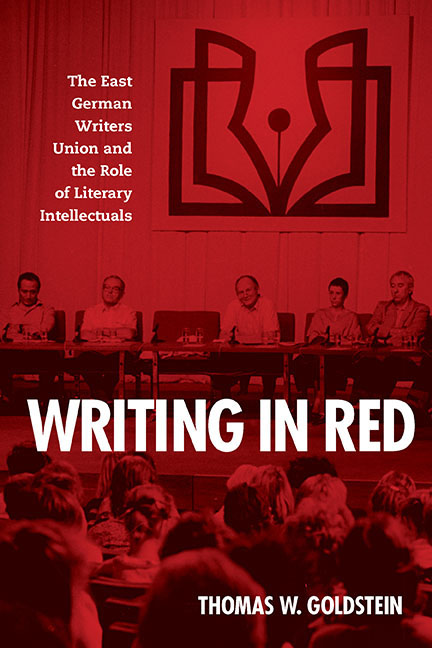Book contents
- Frontmatter
- Contents
- Acknowledgments
- List of Abbreviations
- Introduction
- 1 German Writers Associations through 1970
- 2 Socioeconomic Functions
- 3 The Era of No Taboos? 1971–76
- 4 A Disciplining Instrument, 1976–79
- 5 Defending Peace, Defining Participation, 1979–83
- 6 Years of Resignation, 1983–85
- 7 Glasnost in the GDR? 1985–89
- 8 Coming Full Circle, 1989–90
- Conclusion
- Notes
- Bibliography
- Index
- Frontmatter
- Contents
- Acknowledgments
- List of Abbreviations
- Introduction
- 1 German Writers Associations through 1970
- 2 Socioeconomic Functions
- 3 The Era of No Taboos? 1971–76
- 4 A Disciplining Instrument, 1976–79
- 5 Defending Peace, Defining Participation, 1979–83
- 6 Years of Resignation, 1983–85
- 7 Glasnost in the GDR? 1985–89
- 8 Coming Full Circle, 1989–90
- Conclusion
- Notes
- Bibliography
- Index
Summary
“I REGRETTED THAT,” Rosemarie Schuder told me. The historical novelist, just shy of her eighty-fifth birthday, paused and looked away as I asked about the expulsion of nine members of the East German Writers Union (Schriftstellerverband der DDR, SV) in 1979. It was unclear from her answer whether she, a member of the union's Berlin branch that carried out these actions, meant to imply that she regretted supporting these steps (she did not participate in the meeting) or regretted not doing enough to prevent them. Either way, her answer gave me pause. Here was an author who, despite refusing to join the Socialist Unity Party (SED), had risen to become one of the few female members of the SV presidium, its main leadership body. Her literature and activism had been dedicated to peace and social justice, as she eventually headed the union's Solidarity Commission, and her membership in the East German Christian Democratic Union was a testament to her commitment to Christian ethics and human dignity. No evidence exists of collaboration with the Ministry for State Security (the secret police or Stasi), a relative rarity for presidium members. In brief, she was someone many considered a good person, a view her kindness during our interview bore out. Yet the fact remains that she had either supported expelling nine colleagues or at least had done little when others did so, thus ending the literary careers of the affected authors in the German Democratic Republic. The question is why?
The American view of the East German dictatorship is often saturated with Cold War images, chief among them the Berlin Wall and Stasi. The coercive side of the dictatorship was very real for millions of citizens whose lives were adversely affected by SED rule. Yet it is also true that the dictatorship could not have functioned without the participation of authors like Schuder, a woman who experienced the horrors of the Nazi regime as a girl and adolescent and who later married author Rudolf Hirsch, a German man whose Jewish heritage would have likely ended in his death had his family not fled to Palestine. How is it that someone who had known the terror of the Third Reich could support a second German dictatorship? Someone who could criticize the SED's authoritarian nature and yet rise to the pinnacle of the most powerful professional organization for the country's writers?
- Type
- Chapter
- Information
- Writing in RedThe East German Writers Union and the Role of Literary Intellectuals, pp. 1 - 19Publisher: Boydell & BrewerPrint publication year: 2017

